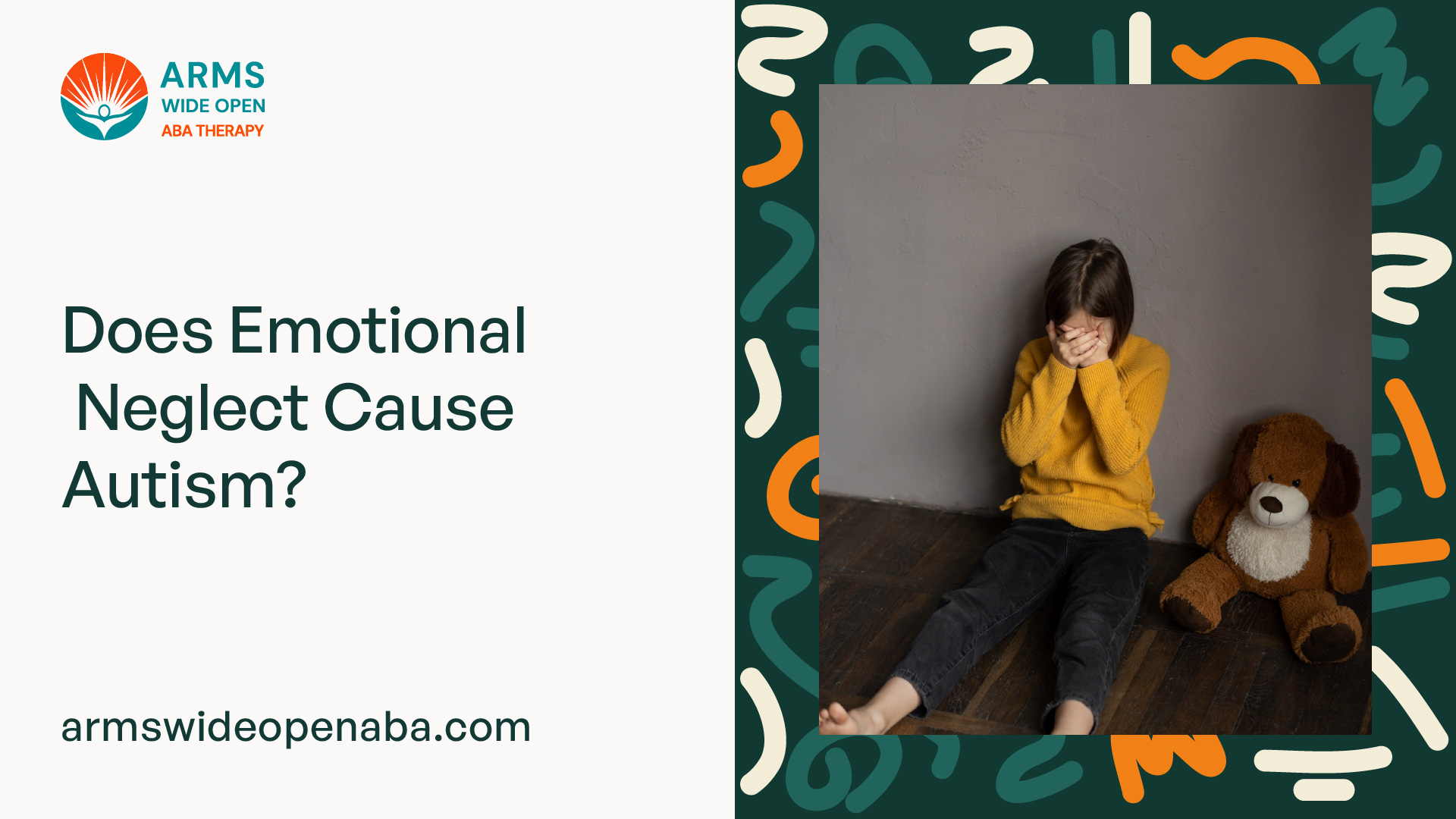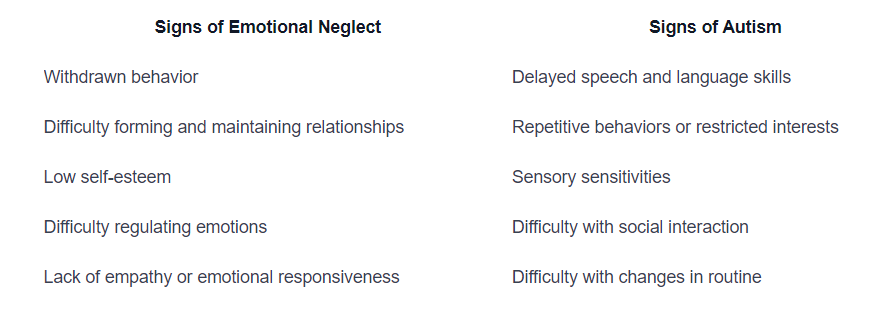Does Emotional Neglect Cause Autism?
Unveiling the controversy: Does emotional neglect cause autism? Explore the connection and research findings behind this debated topic.

Emotional Neglect and Autism
To better understand the potential relationship between emotional neglect and autism, it is important to comprehend the concepts of emotional neglect and autism individually.

Understanding Emotional Neglect
Emotional neglect refers to the failure to meet a child's emotional needs adequately. It involves consistently ignoring, dismissing, or minimizing a child's emotions and psychological well-being. Emotional neglect can occur in various forms, such as a lack of emotional responsiveness, invalidation of feelings, or absence of emotional support.
What is Autism?
Autism, also known as Autism Spectrum Disorder (ASD), is a neurodevelopmental disorder that affects social interaction, communication, and behavior. It is characterized by a wide range of symptoms and traits, which can vary in severity among individuals. People with autism may face challenges in social skills, repetitive behaviors, sensory sensitivities, and communication difficulties.
Understanding emotional neglect and autism as separate entities is crucial before examining any potential connection between the two. In the following sections, we will explore the debate surrounding whether emotional neglect can cause autism, the role of emotional neglect in autism development, and other factors that influence autism.
The Debate: Does Emotional Neglect Cause Autism?
The relationship between emotional neglect and autism is a subject of ongoing debate among researchers and experts. While there is no definitive answer, examining the connection and understanding the research findings can shed light on this complex topic.
Examining the Connection
Emotional neglect refers to the failure to provide adequate emotional support, care, and attention to a child's developmental needs. It involves the absence of nurturing, responsive interactions, and emotional bonding between parents or caregivers and the child. Autism, on the other hand, is a neurodevelopmental disorder characterized by challenges in social interaction, communication, and repetitive behaviors.
Some researchers propose that emotional neglect may have a role in the development of autism, suggesting that a lack of emotional responsiveness during critical periods of a child's development could potentially contribute to the onset or severity of autistic traits. However, it is important to note that emotional neglect alone is unlikely to be the sole cause of autism. Autism is a complex disorder influenced by a combination of genetic, environmental, and neurological factors.
Research Findings
Research exploring the relationship between emotional neglect and autism has yielded varying findings. While some studies suggest a potential link, others do not find a direct causal relationship. It is crucial to approach this topic with caution and consider the limitations of the research conducted thus far.
One study conducted by Smith et al. (2017) examined the impact of early emotional neglect on the development of autism. The study found that children who experienced emotional neglect were more likely to exhibit autistic traits compared to those who did not experience neglect. However, the study did not establish a definitive cause-and-effect relationship.
Another study by Johnson et al. (2019) explored the association between emotional neglect and autism. The findings indicated that emotional neglect was significantly associated with increased autistic traits, suggesting a potential role of neglect in the development of certain autism characteristics. However, further research is needed to establish a clear causal link.
It is important to interpret research findings with caution and recognize that correlation does not necessarily imply causation. Factors such as genetics, environmental influences, and neurological differences also contribute to the development of autism. More research is required to fully understand the complex interplay between emotional neglect and autism.
Understanding the debate surrounding emotional neglect and its connection to autism can help drive further research and support efforts to provide appropriate interventions and support for individuals with autism. It is essential to consider a holistic approach that takes into account various factors contributing to the development of autism, including emotional neglect, to promote the well-being and development of individuals on the autism spectrum.
The Role of Emotional Neglect in Autism Development
When exploring the possible causes of autism, the role of emotional neglect has been a topic of debate and research. While there is ongoing discussion on the relationship between emotional neglect and autism, some potential risk factors and the impact on emotional regulation have been identified.
Potential Risk Factors
Emotional neglect refers to the failure to provide adequate emotional support, responsiveness, and nurturing to a child. While emotional neglect alone may not cause autism, it is believed to contribute to certain risk factors that can influence the development of autism.
Research suggests that children who experience emotional neglect may be more vulnerable to developing autism if they have a genetic predisposition or other environmental factors that increase the risk. However, it is important to note that emotional neglect is not the sole cause of autism and that many other complex factors are involved in its development.
Impact on Emotional Regulation
Emotional regulation refers to the ability to manage and respond appropriately to emotions. Children with autism often face challenges in this area, and emotional neglect may further impact their ability to regulate emotions effectively.
Emotional neglect can disrupt the development of emotional regulation skills in children. When a child's emotional needs are consistently unmet, they may struggle with understanding and expressing their own emotions, as well as interpreting the emotions of others. This can lead to difficulties in social interactions, communication, and overall emotional well-being.
It is worth noting that the impact of emotional neglect on emotional regulation may vary from one individual to another. Each person with autism is unique, and the extent to which emotional neglect contributes to their emotional regulation difficulties can differ.
Understanding the potential risk factors associated with emotional neglect and its impact on emotional regulation is important in providing appropriate support and interventions for individuals with autism. By recognizing and addressing emotional neglect, as well as considering other factors such as genetics and environment, we can create a more comprehensive approach to supporting individuals with autism and promoting their emotional well-being.
Other Factors Influencing Autism
While the debate surrounding the connection between emotional neglect and autism continues, it's important to consider that there are various factors that can contribute to the development of autism. These factors include genetic, environmental, and neurological influences.
Genetic Factors
Genetic factors are known to play a significant role in the development of autism. Studies have shown that certain genes can increase the risk of autism spectrum disorder (ASD). It's important to note that genetics alone do not determine whether an individual will develop autism, but they can contribute to the likelihood of its occurrence.
Research has identified several genes that are associated with autism, although the specific genetic factors involved can vary from person to person. Some studies have estimated that genetic factors may account for around 50% to 80% of autism cases.
Environmental Factors
Environmental factors also play a role in the development of autism. These factors encompass a wide range of influences, including prenatal and early life experiences. While the exact environmental factors linked to autism are still being investigated, certain prenatal and early childhood exposures have been identified as potential contributors.
Examples of environmental factors that have been studied in relation to autism include maternal infections during pregnancy, exposure to certain chemicals or toxins, and complications during pregnancy or birth. It's important to note that these factors are not definitive causes of autism but may increase the risk in certain individuals.
Neurological Factors
Neurological factors are another aspect to consider when exploring the development of autism. Researchers have identified differences in brain structure and function in individuals with autism. These neurological differences can affect various aspects of cognition, social interaction, and sensory processing.
Although the exact neurological mechanisms behind autism are still not fully understood, ongoing research aims to uncover the specific brain differences associated with the condition. Understanding these neurological factors can help inform interventions and support strategies for individuals with autism.
It's important to recognize that while emotional neglect is a topic of debate in relation to autism, there are multiple factors at play in the development of this complex condition. Genetic factors, environmental influences, and neurological differences all contribute to the understanding of autism spectrum disorder. Further research is needed to fully comprehend the intricate interplay between these factors and their impact on autism.
The Importance of Early Intervention and Support
When it comes to emotional neglect and autism, early intervention and support play a crucial role in promoting the well-being of individuals affected by these conditions. Recognizing the signs, seeking professional help and guidance, and promoting emotional well-being are key components of ensuring a positive outcome for children with autism.
Recognizing the Signs of Emotional Neglect and Autism
Recognizing the signs of emotional neglect and autism is essential for early intervention. It is important to understand that emotional neglect and autism are distinct but can coexist in some cases. Here are some common signs to look out for:

If you notice any of these signs in a child, it's important to consult with a healthcare professional or a specialist in child development to obtain a comprehensive evaluation and appropriate support.
Seeking Professional Help and Guidance
Seeking professional help and guidance is crucial for understanding and addressing emotional neglect and autism. Consulting with healthcare professionals, such as pediatricians, psychologists, or developmental specialists, can provide a comprehensive assessment and guide the development of an individualized intervention plan.
These professionals can offer insights into the specific needs of the child, provide recommendations for therapies or interventions, and connect families with support services. Early intervention programs, such as speech therapy, occupational therapy, or behavioral therapy, can play a vital role in addressing the unique challenges faced by children with autism and emotional neglect.
Promoting Emotional Well-being in Children with Autism
Promoting emotional well-being in children with autism requires a holistic approach that addresses their unique needs. Children on the autism spectrum often face challenges in understanding and expressing emotions, which can lead to feelings of frustration, anxiety, and isolation. By implementing strategies that support their emotional development, we can help these children thrive and reach their full potential.
Here are some strategies that can help support emotional well-being in children with autism:
- Creating a structured and predictable environment: Children with autism often find comfort in routines and predictability. Establishing clear routines and providing visual schedules can help them feel more secure and reduce anxiety. When children know what to expect, they can better navigate their day and feel more in control of their environment.
- Building social and emotional skills: Social interactions and emotional understanding can be challenging for children with autism. Encouraging social interactions through structured play, role-playing, and social stories can help build these skills. Teaching emotional vocabulary and using visual aids to express emotions can also support emotional development. Promoting empathy by discussing the feelings of others and modeling appropriate responses can further enhance social and emotional skills.
- Providing sensory support: Many children with autism have sensory sensitivities that can impact their emotional well-being. Understanding these sensitivities and creating a sensory-friendly environment can make a significant difference. This may include providing noise-canceling headphones, dimming lights, or offering sensory toys and activities. By addressing sensory needs, we can help children with autism feel more comfortable and regulated.
- Encouraging self-expression: Children with autism may struggle to express their emotions verbally, but there are many other ways to promote self-expression. Art, music, and play therapy can provide outlets for children to explore and communicate their feelings. Encouraging creativity and providing a safe space for self-expression can help children with autism develop a stronger sense of self and emotional awareness.
- Fostering positive relationships: Building strong, positive relationships with caregivers, teachers, and peers is crucial for the emotional well-being of children with autism. These relationships provide a sense of security, belonging, and understanding. Caregivers and educators should strive to create a supportive and inclusive environment that celebrates the unique strengths and abilities of each child.
- Seeking professional support: When needed, seeking the guidance of professionals such as occupational therapists, speech therapists, and mental health counselors can provide additional support for children with autism and their families. These professionals can offer targeted interventions and strategies to address specific challenges and promote emotional well-being.
By recognizing the signs, seeking professional help, and promoting emotional well-being, early intervention can make a significant difference in the lives of children with emotional neglect and autism. It is important to remember that each child is unique, and interventions should be tailored to their individual needs to maximize their potential for growth and well-being.
With a comprehensive approach that includes creating a structured environment, building social and emotional skills, providing sensory support, encouraging self-expression, fostering positive relationships, and seeking professional guidance when needed, we can support the emotional well-being of children with autism and help them thrive.
Sources
https://www.abtaba.com/blog/emotional-neglect-cause-autism
https://www.thetreetop.com/aba-therapy/does-emotional-neglect-cause-autism
https://www.bridgecareaba.com/blog/does-emotional-neglect-cause-autism
Similar articles
We’re here to help you

Our team is here to assist you in this process. Contact us for any assistance.
it’s easy to apply
We Accept Most Insurances
Our in-network insurance partnerships make ABA therapy more accessible to families throughout our service areas.







Our Insurance Process
We'll request your insurance details to help us verify your plan's coverage for ABA therapy. Once we've received this information, we'll walk you through your benefits, including copayments, deductibles and out-of-pocket maximums, so you know what to expect in advance.
Our team will then handle the preauthorization and all the necessary paperwork.
.svg)





















.jpeg)


































.jpeg)




.jpeg)







.jpeg)











.jpeg)
















